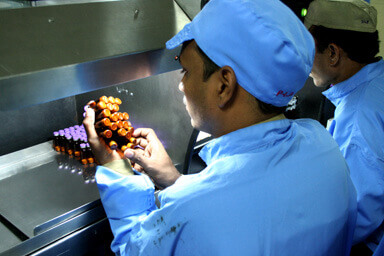Kevin Fisher is the Policy Director for GHTC member AVAC: Global Advocacy for HIV Prevention, an organization that focuses on accelerating the development and delivery of critical AIDS vaccines and HIV treatment and prevention tools. AVAC and partners are hosting a congressional briefing this week to discuss promising results from a Military HIV Research Program’s (MHRP)-sponsored trial to develop a safe and effective HIV vaccine.
Although further research is needed, a safe and effective HIV preventive vaccine has now been shown to be possible. In 2009, the Military HIV Research
Program’s (MHRP)-sponsored RV144 trial became the first HIV vaccine trial ever to demonstrate effectiveness in preventing HIV infection, lowering the
rate of HIV infection by 31.2 percent. MHRP, along with the study partners, announced another significant discovery in September 2011. Aiming to better
understand how RV144 protects against HIV infection, the research team found two important molecular clues—two antibodies whose presence either
increases or decreases the risk of HIV infection. With these findings, we are the closest we have come to discovering a scientific pathway to an HIV
vaccine after three decades of research. The MHRP plans to evaluate the clues they discovered with follow-up studies. However, lack of funding for
the MHRP may prohibit the researchers from advancing as planned.

- New findings show that we are the closest we have come to discovering a scientific pathway to an HIV vaccine after three decades of research. Photo:
Satvir Malhotra/PATH
Since 1986, the MHRP has worked to develop a safe, globally effective HIV vaccine and began providing critical support for the President’s Emergency Plan
for AIDS Relief (PEPFAR) programs in Africa in 2004. Vaccines are one of the most powerful tools for preventing infectious diseases and should be one
of the highest priorities of the research and scientific community to prevent the spread of HIV. While the unique properties of the HIV virus make
finding a safe and effective vaccine one of the greatest challenges in science today, the MHRP has made extraordinary strides in meeting this challenge.
MHRP is also a critical PEPFAR partner. While its primary focus is developing a globally effective HIV vaccine, the program provides prevention, care,
and treatment through PEFFAR. With five sites in Africa and Asia, MHRP leverages existing in-country technical expertise and administrative infrastructure
to expand partnerships with local researchers, health care services and NGOs to implement PEPFAR activities.
Just as we are on the brink of a major breakthrough in HIV prevention the world is facing a global AIDS funding crisis. HIV treatment funding shortages
and continued infection rates threaten to overtake progress made in the previous decade. The US has a critical role to play in stopping the spread
of the epidemic, and through such programs as the MHRP the US can dramatically advance science and move forward the development of a safe and efficacious
vaccine to control and halt the spread of HIV. As Secretary of State Hillary Clinton recently said, “An AIDS-free generation would be one of the greatest
gifts the United States could give to our collective future.”
On December 9th AVAC: Global Advocacy for HIV Prevention, amfAR, the Foundation for AIDS Research and the Infectious Disease Society of America, in cooperation
with Sen. Barbara Mikulski, will be holding a congressional briefing focused on the work of MHRP. Join us to discuss the recent exciting and promising
results from the MHRP scientific team and critical efforts to increase the impact of the PEPFAR program by delivering lifesaving drugs and prevention
tools more effectively.
Speakers will include: Dr. Debbi Birx (Centers for Disease Control and Prevention), Dr. Alan Fix (National Institute for Allergy and Infectious Diseases),
Col. Nelson Michaels (MHRP) and Dr. Fred Sawe (Walter Reed Army Institute of Research–PEPFAR program, Kenya).
Innovations in HIV Vaccine Development and PEPFAR Implementation through the Military HIV Research Program
Friday, December 9, 2011
12:00-1:30 p.m.
385 Russell Senate Office Building SR-385
Lunch will be provided
For more information or to RSVP, please contact Emily Donaldson at AVAC at edonaldson@avac.org.

